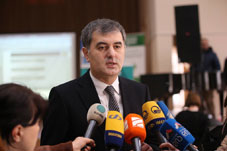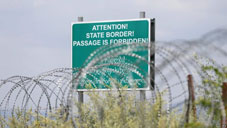
Actions in Georgia’s occupied regions illegitimate
By Tea Mariamidze
Friday, April 7
Sozar Subari, Georgia’s Minister of Internally Displaced Persons from the Occupied Territories, Accommodation and Refugees, commented on the new demand of the de-facto authorities of Georgia’s occupied region of South Ossetia (Tskhinvali), according to which the locals will not be permitted to cultivate their lands located near the Administrative Boundary Line (ABL).
Subari stressed that any actions in Georgia’s occupied Tskhinvali and Abkhazia regions are “illegitimate”.
"The outcome of the 2008 Russian aggression against Georgia is that 22% of our territories are occupied and the people living near the dividing line have constant problems. This will continue until the occupation is over,” the minister stated.
According to Subari, today, the conflict resolution has become much more complicated and it will be hard to resolve the ongoing issues.
The minister underlined that the government does its best to assist Georgian citizens living at the ABL.
"First of all, this assistance is reflected in the fact that gasification has been carried out in all villages. Also, allowances are allocated for those students who are from the conflict line villages. We also assist the locals financially,” he added.
Subari believes that the occupation can be ended only by persistent efforts from the international community.
“This is possible because such efforts really exist,” the minister added.
Moreover, the de-facto government of Georgia’s breakaway Tskhinvali region has announced that the administrative border with Georgia will be closed from April 7 to April 10 due to the so-called presidential elections and a referendum.
Both the elections and the referendum will be held on April 9. The referendum aims at changing Tskhinvali’s name to "the Republic of South Ossetia – the State of Alania” similar to the name of North Ossetia-Alania, which is a federal subject of Russia.
The Georgian authorities believe that April 9 was deliberately chosen by the de facto authorities, as it is a very important day in the history of Georgia.
On April 9, 1989, at least twenty people were tragically killed as Soviet troops attacked peaceful protesters in the center of Tbilisi. The date has been etched into the minds of locals and is remembered as the day of National Unity of Georgia.


